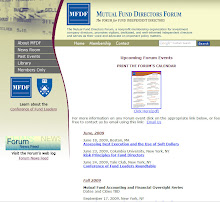Board IQ recently assembled a panel of experienced mutual fund trustees and industry specialists whose objective was to brainstorm about emerging best practices and lessons learned by fund board as a result of the current financial turmoil. The panel came up with several suggested action steps for boards which they have laid out in a document entitled, "Lessons Learned: Emerging Best Practices Amid the Financial Crisis."

- Communicate more within the board and with management, review and refine your board's processes, but avoid the temptation to become managers rather than overseers.
- Understand your fund's valuation procedures and processes, particularly when dealing with fair value situations, verify that management has a comprehensive, consistent and objective valuation process, and employ backtesting and independent pricing services.
- Times of financial turmoil can elicit conflicts of interest due to pressures on the fund's managers. Be aware of the potential for conflicts when the funds have illiquid assets, and the temptation may be there to advantage one set of fund shareholders over another, and pay particular attention to best execution during market dislocations.
- Focus on risk management that encompasses more than just the risks the funds are exposed to, but rather the exposure to enterprise risk. That is, the extent of the fund's and fund complex's exposure to other companies, like counterparty risk. Consider concentration limits, securities lending, and cash collateral issues carefully.
- Because some complex securities, despite their bad reputation, can still be viable and useful investments, they still can serve important uses, and both directors and management should understand them better.
- Boards should employ and rely on the CCO to enhance their effectiveness by meeting regularly with them, and partnering with the CCO to help create a culture of compliance and foster a risk management environment.
- Boards should urge the adviser to stay in close touch with investors during these turbulent markets, to answer investors' questions promptly, and to pay special attention to shareholder disclosures.
- Boards should prepare themselves for the longer term effects of the financial crisis, particularly new regulations and new compliance requirements and expenditures.






